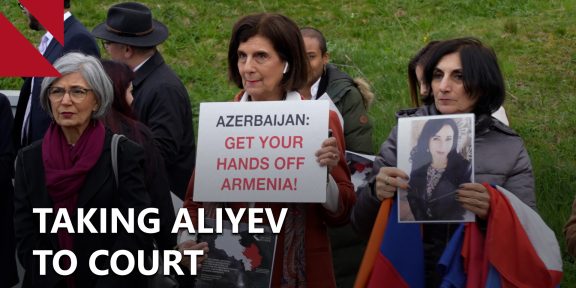By Mark Dovich
France and the United States have condemned Azerbaijan’s move Sunday to set up a checkpoint on the sole overland route between Armenia and Nagorno-Karabakh, while Russia has expressed “serious concern” over the development.
Vedant Patel, a State Department spokesperson, said in a statement that “Azerbaijan’s establishment of a checkpoint on the Lachin corridor undermines efforts to establish confidence in the peace process” and called on “the parties to resume peace talks and refrain from provocations.”
France’s Foreign Ministry echoed those remarks, saying the checkpoint “breaches the commitments made under the ceasefire agreements and jeopardizes the negotiation process” and urged for “free movement of property, people and goods to be restored” between Armenia and Nagorno-Karabakh.
Meanwhile, Russia’s Foreign Ministry released a statement expressing “serious concern” over “any unilateral steps in violation of the basic provisions” of the 2020 ceasefire, but notably did not mention Azerbaijan’s move to set up a checkpoint.
Interestingly, though, Russia’s peacekeepers in Nagorno-Karabakh went further and did explicitly call out Azerbaijan’s “unilateral and unauthorized actions” in their daily bulletin, adding that “the leadership of the peacekeeping contingent is holding negotiations with the Azerbaijani side” over the matter.
France, Russia, and the United States co-chair the Minsk Group, a body formed in the 1990s to encourage a peaceful resolution to the conflict between Armenia and Azerbaijan. The diplomatic fallout of Russia’s full-scale invasion of Ukraine last year in effect froze the group’s work.
Since then, the EU has taken steps to become more involved in mediation efforts in the region, most notably by deploying a civilian monitoring mission to the Armenian side of the border with Azerbaijan in February.
Josep Borrell, Brussels’ top diplomat, has also condemned Azerbaijan’s move to set up a checkpoint on the Lachin corridor, saying it “runs counter to our call for reducing tensions.”
What happened?
On Sunday, Azerbaijani border guards moved to block the Hakari bridge, which lies within the Lachin corridor close to the border with Armenia, and set up a checkpoint there, dramatically escalating tensions in the region.
In a statement, Azerbaijan’s Foreign Ministry cited “the continued systematic and large-scale misuse” of the Lachin corridor, a five-kilometer-wide strip of land containing Nagorno-Karabakh’s only road to Armenia and the outside world, “for illicit purposes by the Armenian side.”
Since the end of the 2020 war, Baku has repeatedly accused Armenians of using the corridor to smuggle weapons into Nagorno-Karabakh and demanded to set up checkpoints along the route to check for arms shipments. Yerevan and Stepanakert have time and again dismissed those claims as groundless.
The move is a violation of the Russia-brokered ceasefire that halted large-scale military operations in and around Nagorno-Karabakh in November 2020. That deal says the Lachin corridor should “remain under the control of the peacekeeping contingent of the Russian Federation,” while Azerbaijan should “guarantee the safe movement of persons, vehicles, and cargo along the Lachin corridor in both directions.”
Baku’s decision to set up the checkpoint also set off a wave of criticism in Yerevan and Stepanakert, with authorities in both cities calling on Moscow to take steps to defuse tensions in the region.
In a column for CivilNet, regional analyst Tigran Grigoryan argued that by “calling Moscow out and basically demanding from the Kremlin to fulfill its obligations,” the authorities in Nagorno-Karabakh had taken an “unprecedented” step that “shows the severity of the situation on the ground.”
Read more: Regional security in peril: Azerbaijan’s checkpoint in Lachin corridor
The establishment of the checkpoint has completely isolated four Armenian villages in Nagorno-Karabakh, which lie between the new checkpoint and the section of the Lachin corridor where Azerbaijanis set up a roadblock last year.
Nagorno-Karabakh State Minister Gurgen Nersisyan said on Facebook Monday he is “personally in touch with the heads” of the four villages, adding that he had asked the Russian peacekeepers to help provide medical care to residents of Hin Shen, Lisagor, Mets Shen, and Yeghtsahogh as needed.
What’s the context?
Last December, a group of self-styled Azerbaijani environmental activists, many of whom were later revealed to be connected with the Azerbaijani government, began blocking the Lachin corridor near the city of Shushi.
The roadblock, now into its fourth month, has prompted severe shortages of energy, food, medicine, and other essentials throughout Nagorno-Karabakh.
The blockade has also wreaked havoc on Nagorno-Karabakh’s economy, which is highly dependent on Armenia’s. A report last month by a team of Armenian economists, led by former Finance Minister Vardan Aramyan, found that total losses by that point had already equaled about 20% of Nagorno-Karabakh’s gross domestic product.
Also watch: Unpacking the impact of Azerbaijan’s blockade on Nagorno-Karabakh’s economy
In February, the International Court of Justice ordered Azerbaijan to “take all measures at its disposal to ensure unimpeded movement of persons, vehicles and cargo along the Lachin Corridor in both directions.” The ruling is legally binding, but the court has no enforcement powers.
















